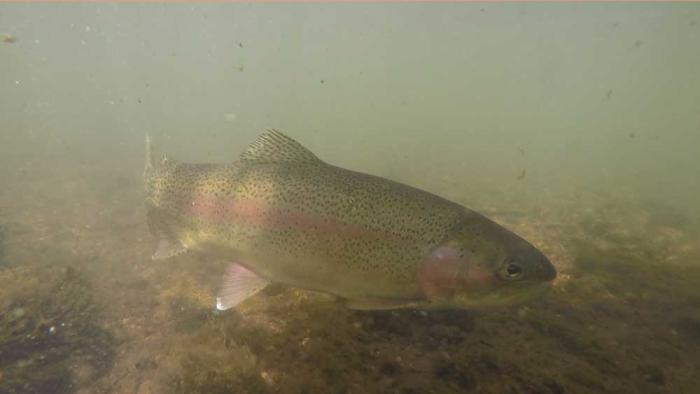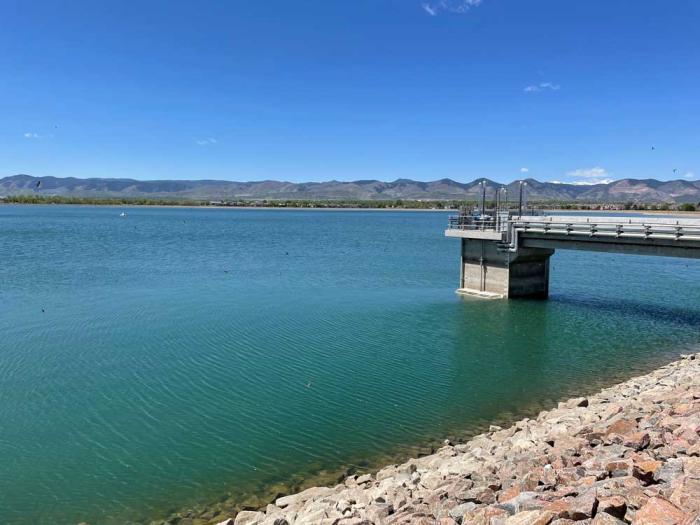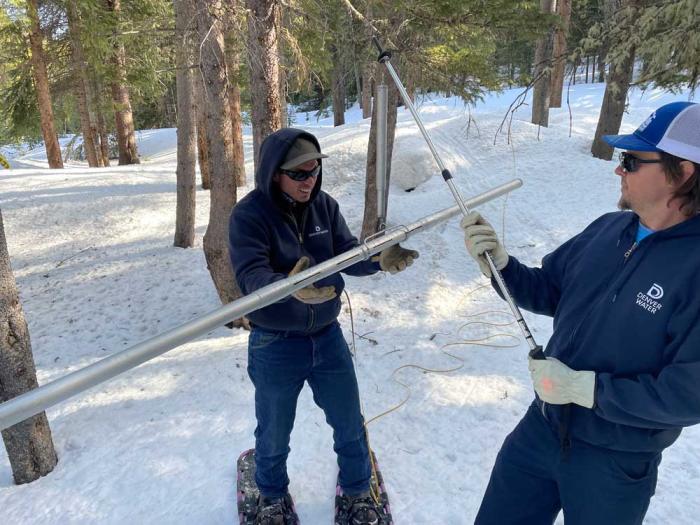July’s hot temperatures affecting high-mountain streams, fish
July is scorching once again, and it’s putting stress on high-country habitat for fish and aquatic insects.
The water temperatures are so high in some areas that Colorado Parks and Wildlife on July 14 enacted voluntary fishing closures until further notice. The voluntary closures include waterways on the Fraser and Colorado rivers where Denver Water collects some of its water supply — along with other water users and diverters who rely on these same streams and rivers.
Earlier this year, Denver Water was able to adjust its collection operations to benefit some mountain streams, but the utility’s options have dwindled as the summer’s heat has continued.
“We work hard to build flexibility into our system so we can adjust operations and provide additional flows when the streams and rivers where we collect Denver’s drinking water supply are stressed due to hot temperatures,” said Nathan Elder, manager of Denver’s water supply.
Read how Denver Water and other groups collaborate via a Learning By Doing approach to improve rivers and streams in Grand County.
Earlier this year, Denver Water was able to leave 23,000 acre-feet of water in the Fraser River, and an additional 2,500 acre-feet of water in the Williams Fork River, that's more than enough water to completely fill the utility’s Marston Reservoir in southwest Denver.
The utility carefully calibrated the flow of the extra water to help flush the river of sediment, improving the habitat for fish and the tiny, aquatic bugs that live in the river.
Through its collaboration with Learning By Doing and Wild and Scenic partners, in the past Denver Water has been able to strategically bypass water past its collection points to help during times of distress along the streams and rivers in Grand County.
These actions have benefited the Fraser River and Ranch Creek, one of the Fraser’s tributaries and a favored trout-fishing stream that lies east of Tabernash.
But the utility faces challenges in doing so now.
One challenge has to do with water rights and honoring cross-Divide agreements reached with multiple parties over the years.
According to Elder, Denver Water has approximately 20,000 acre-feet of water that it is obligated to release from Wolford and Williams Fork reservoirs in Grand County in the next few months. There are agreements that dictate how and when the water is released — and doing so early is not possible.
Once the release can occur per the agreement, Denver Water will do it in ways that best benefit the river, working with its partners to maximize the amount released and when.
Additionally, Denver’s water managers simply have less flexibility in the utility’s system this year.
After a lackluster snowpack season coupled with reservoir storage restrictions at Gross Dam due to construction, Denver Water’s planners simply don’t have enough water in storage to be able to bypass large amounts of water to the river at this time. After consulting with Learning By Doing in Grand County, Denver Water has made 200 acre-feet of water available to send down the Fraser River to reduce stream temperatures and help the fish.
Denver Water will need to make operational changes to its system to make up for the water released to the river.
And while the Gross Reservoir Expansion Project construction has reduced some of Denver Water’s latitude in the short term, Elder emphasized that — once completed — the utility will have more flexibility throughout its system to react to year-to-year changes in snowpack levels, extreme weather swings and unbalanced conditions across the state.
For Grand County, the end of the project means an additional 1,000 acre-feet of water will flow down the county’s rivers and streams — including the Fraser and Williams Fork rivers and Ranch Creek — every year after the expansion project is finished, as outlined in the Colorado River Cooperative Agreement signed in 2013 by Denver Water, Grand County Commissioners, Trout Unlimited and 15 other entities.
“We’re committed to working with our fellow stakeholders to evaluate all options and explore ways to help the river during this dry stretch,” Elder explained.
“We just need to make sure that we are following the laws of the river, honoring our agreements and ensuring there are no unintentional consequences that may also have impacts to the aquatic habitats in other streams and rivers.”
Denver Water also is continuing its focus on efficiency efforts in the Denver metro area, which is also wilting from the dry and hot conditions.
“We’re seeing our customers, as a group, use 25% less than what they did during similarly hot, dry stretches in past years — and that’s with 250,000 more people in our service area,” said Greg Fisher, demand manager for Denver Water. “Every drop customers are able to save along the Front Range improves our ability to help the rivers and streams we value in the watersheds we depend on for our drinking water supply.”
The reductions in metro area water use over the last two decades occurred despite significant population growth.
Denver Water doesn’t have any control over growth in its service area, but the utility has been working hard with the communities it serves to ensure the metro area is growing smarter, explained Fisher.
Can you name the seven main points of Denver Water’s annual summer watering rules? (See how you scored.)
“Between increased innovations for efficient fixtures, developers being incentivized to make water-smart decisions, and the fact that the city is becoming denser — our customer base is more efficient per capita than ever,” he said.
For example, since 2018, Denver Water has been offering developers a rebate on their System Development Charge (the fee developers pay to connect to the water system), when they install the highest efficiency fixtures, landscape designs and irrigation technology.
“We want to make sure the entire property, inside and outside, is being developed as efficiently as possible, especially as our service area becomes denser,” Fisher said.
While city and urban water users consistently use less water than they did prior to the drought of 2002, even as the population has boomed, Fisher stressed that the communities Denver Water serves must always be aware that we live in a dry climate.
“We need to use water wisely no matter what the conditions are,” he said. “Ultimately, we never know when the next drought will begin or how long it will last.”
Despite the lackluster statewide snowpack this year, Denver Water’s storage system still reached 92% full, not quite a trigger for additional drought restrictions — on top of its annual watering rules that require water-smart irrigation practices — but a sign stressing the need for continue vigilance on water usage.
According to Elder, when it comes to water in Colorado, it’s all connected.
“Denver Water has been part of Grand and Summit counties for decades, and we understand the impact diversions have on the rivers and streams,” he said. “Our goal is to manage our water resources as efficiently as possible and be good stewards of the water.”






